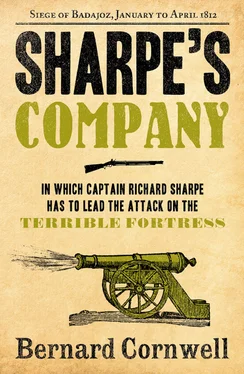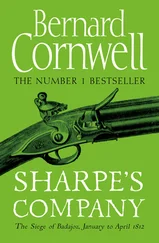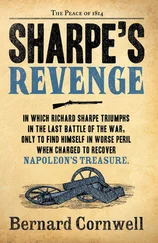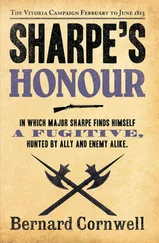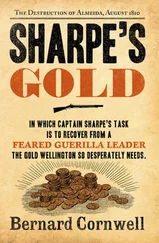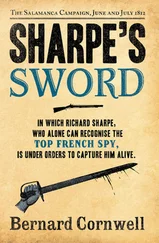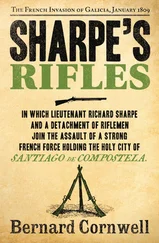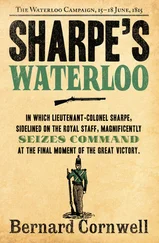The growl was still audible. The men from Connaught and Nottinghamshire were going back to the breach, over their mangled dead, past the blackened, smoking pits where the mines had been dug, and the French screamed insults at them; called them boy-lovers and weaklings, and followed the insults with more burning carcasses and lumps of timber or stone that avalanched on the slope and hurled men back into the blood-soaked base of the breach. The vast guns in their hidden, flanking casements were being reloaded, ready for their next targets, and they came, clawing their way up the blood-slick ramp till the thunder crashed again, the flames slapped at the breach, and the myriad scraps of grapeshot blasted the stones clear.
The assault had been bloodily repulsed, but there was no thought except to go forward. The foot of the ramp was crowded with the men of the two battalions who climbed again in the mindless, seething bravery of siege warfare.
Lawford clutched Sharpe’s arm, leaned close to his ear. ‘Those bloody guns!’
‘I know!’ They fired again, a fraction early, and it was plain that no man could climb past their fire. They were dug into the very heart of the town’s thick, low wall and no British siege gun could have hoped to reach them; not unless Wellington had fired at each hidden casement for a week until the whole wall collapsed like the breach itself. In front of each gun, revealed by the burning carcasses, was a trench that defended the gunners from their enemy on the breach, and as long as the two guns were firing, across and slightly ahead of each other, there could be no victory.
The troops were climbing again, slower now, wary of the guns and trying to avoid the burning grenades that the French were tossing on to the slope. The red explosions punctured the scattered attackers. Sharpe turned to Harper. ‘Are you loaded?’
The huge Sergeant nodded, grinned, and held up the seven-barrelled gun. Sharpe grinned back. ‘Shall we join in?’
Lawford shouted at them. ‘What are you doing?’
Sharpe pointed at the nearest side of the breach. ‘Going after the gun. Do you mind?’
Lawford shrugged. ‘Be careful!’
There was no time to think, just to jump into the ditch and pray that their ankles would not twist or break. Sharpe fell awkwardly, slipping on the snow, but a huge hand grabbed his greatcoat, hauled him upright, and the two men ran across the floor of the ditch. The jump had been twenty feet and it seemed as if they had fallen into the bottom of a giant cauldron, an alchemist’s vessel of fire, and the flames poured in from above. Carcasses rolled down, musket and cannon flame spat from above, and the fire spilt on to the living and dead flesh in the ditch and was reflected red on the underside of the low clouds that rolled southwards to Badajoz. There was only one way to live in the cauldron, and that was to go upwards, and the column was climbing again as Sharpe and Harper skirted the mass of men, and then the guns spoke, and the attack was flung back by the flame-borne grape-shot.
Sharpe had been counting the gaps between the shots and knew that the French gunners were taking about a minute to reload each giant gun. He counted the seconds in his head as the two men struggled past the mass of Irishmen to the left of the breach. They fought their way through the crush, going for the very edge of the slope, and the surge of men carried them forward so that, for an instant, Sharpe thought they would be carried on to the rubble slope itself. Then the guns fired again and the men ahead recoiled, something wet slapped Sharpe’s face, and the attack was broken into small groups. He had a minute. ‘Patrick!’
They threw themselves into the trench beside the breach, the trench that protected the gun. It was already filled with men sheltering from the grapeshot. The French gunners, over their heads, would be sponging out and desperately ramming the huge, serge bags of powder into the vast muzzles while other men waited with the lumpy, black bags of grapeshot. Sharpe tried to forget them. He looked up the wall to the casement’s lip. It was high up, far higher than a man’s height, so he braced his back on the wall, cupped his hands and nodded to the Sergeant. Harper put a massive boot into Sharpe’s hands, cocked the seven-barrelled gun, and nodded back. Sharpe heaved and Harper pushed up, the Irishman weighed as much as a small bullock. Sharpe grimaced with the effort and then two of the Connaught Rangers, seeing their intention, joined in and pushed up on Harper’s legs. The weight suddenly disappeared. Harper had grasped the casement’s edge with one hand, ignoring the musket bullets that flattened themselves on the wall beside him, threw the huge gun over the edge, aimed blindly, and pulled the trigger.
The recoil slammed him back, cruelly throwing him on the opposite lip of the trench, but he scrambled to his feet, screaming in Gaelic. Sharpe knew he was telling his countrymen to climb the wall and attack the gun crew while they were still dazed by the shattering blast. But it was hopeless trying to climb the steep wall, and Sharpe thought of the surviving gunners loading the huge cannon. ‘Patrick! Throw me!’
Harper seized Sharpe like a bag of oats, took one breath, and threw him bodily upwards. It was like being lifted by a mine explosion. Sharpe flailed, his rifle slipping from his shoulder, but he caught it by the barrel, saw the casement’s edge and desperately threw out his left hand. It held, he had a leg on the stonework; he knew the French muskets were firing at him, but he had no time to think of that for a man was running at him, a rammer raised to strike down, and Sharpe struck out with his rifle. It was a lucky effort. The brass-hilted butt caught the Frenchman on the temple, he staggered back, and Sharpe had dropped over the casement, found his feet, and the huge sword rasped out of the scabbard and the joy was there.
The gunners had been hit hard by the seven bullets that had ricocheted round the stone emplacement. Sharpe could see bodies lying beneath the huge, iron barrel of what he recognized as a siege gun, but there were still men alive and they were coming at him. He swung the long blade at them, drove them back, hacked down with the sword and felt it shudder as it cleaved a skull. He screamed at them, scaring them, slipped on new blood, tugged the blade free and swung again. The French went back. They outnumbered him six to one, but they were gunners more used to killing at a distance than seeing the face of their enemy wild over a naked sword. They cowered back and Sharpe turned, back to the casement’s edge, and found an arm clinging desperately to the stonework. He grabbed the wrist and heaved a Connaught Ranger into the sunken gun-pit. The man’s eyes were bright with excitement. Sharpe yelled at him. ‘Help the others up! Use your sling!’
A musket ball went past his head, clanging off the barrel of the gun, and Sharpe whirled to see the familiar uniforms of French infantry running down the stone stairs to rescue the gun. He went for them, wild with the madness of battle, and the crazy thought whirled in his head that he wished the mean-faced bastard clerk in Whitehall could see him now. Perhaps then Whitehall would know what its soldiers did, but there was no time for the thought because the infantry were coming down the narrow space beside the barrel. He leaped at them, shouting and lunging with the point to drive them back and he knew he was outnumbered.
They checked, let him come, and then countered with their long bayonets. The sword was not long enough! He swung at them, smashing bayonets to the side, but another came past his swing and he felt the blade catch in his greatcoat. He seized the barrel with his left hand, pulled the man off balance and brought the great brass hilt of the sword down on his head. He was forced back. Another bayonet flickered at him, making him dodge wildly so that he slipped against the siege gun, his sword was whirling uselessly, flailing for balance, and he saw the bayonets above him. His anger was useless because he could not parry.
Читать дальше
